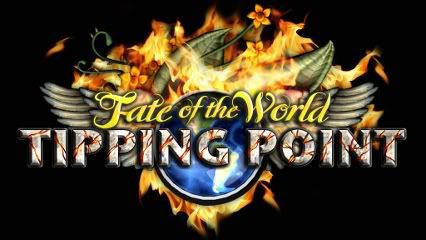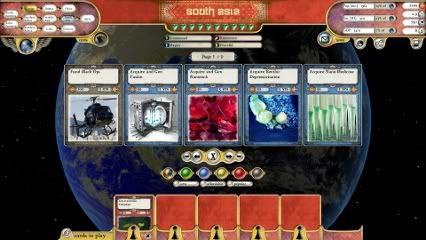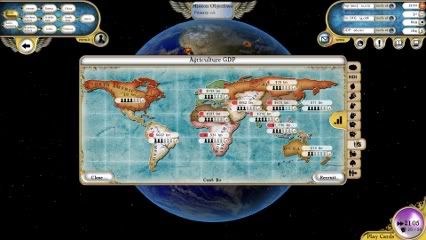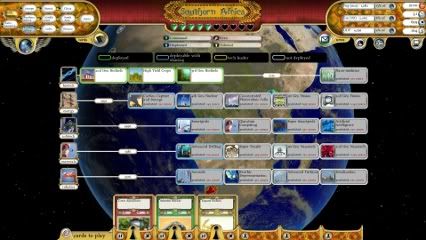
- Format: PC (version reviewed), Mac
- Unleashed: Out Now
- Publisher: Lace Mamba Global
- Developer: Red Redemption
- Players: 1
- Site: http://fateoftheworld.net/
A dystopian future filled with death and horror is a staple plot point for many games. Just look at the bleak glimpses ahead that Deus Ex and Rage provide. What would have needed to happen in order to prevent such a messy and depressing existence? Enter Fate of the World: Tipping Point, a global turn-based strategy game that places the fate of mankind squarely in your hands. You don’t have the threat of planet melting asteroids or zombie plagues to fight against – just the will of people. This’ll be a breeze, right?
Fate of the World places you at the head of GEO, the Global Environment Organisation tasked with tackling the problems that threaten humanity’s future. Global climate change is becoming a serious problem that starts to heavily impact the environments our fussy little race inhabits. The game is made up of several scenarios that challenge you to keep the world happy until certain years up to 2200 whilst meeting winning conditions, such as keeping global temperature rises low. Tipping Point includes the core game and all DLC released for it so far.

If only planning five year policies was as simple as handing an advisor a card.
Every turn you can recruit agents across up to 12 territories all over the world. Each agent allows you to enact one area specific policy per turn within the region they reside. Policies take the form of cards and cover a range of actions, from committing to specific energy sources to focussing on the welfare of people. For example, if you have two agents in Northern Africa, one can play the ‘Commit to Nuclear’ card to influence the nation’s energy production, whilst the other can activate the ‘Medical Welfare Programme’ card to address public health issues for that turn. The cards you play are entirely down to you, but each region has its own bulletin notice with concerns the people or government hold that should help influence what policies you enact.
At its core it sounds like a simple card management game, but it really isn’t. Every action you take has a consequence which often has a knock on affect further down the line. Floods, fires, storms and other natural disasters randomly batter countries which then blame you if their defences weren’t adequate enough. Neglected health, education and work programmes can rally hatred towards you and drive regions to war. Even your agents can go missing in the field when things get a bit too hairy.
Battling climate change and the needs of a planet is really hard, with the frustrating challenge of striking a balance between the two setting the difficulty curve ridiculously steep. You will fail your first few games, even with easy mode enabled. This is where our major quarrel lies with Fate of the World, as defeat really drains your motivation to continue. For example, we thought we had done really well in the second scenario, where we had reached the year 2080 whilst maintaining good relations with all regions and keeping oil production up as the objective had asked. Needless to say the defeat screen was a surprise. It turns out the Human Development Index of North Africa and India was too low.

All 12 tabs on the right side of this panel hide lots of essential data.
Whilst we were aware that raising HDI above a certain point in every region was a necessary winning condition, there is no obvious indication when you are failing this objective. The HDI data is hidden away on one of the many stats pages that overwhelm your eyes with so much information, it might as well be presented in Klingon. There are so many figures to take in that are simply not explained by the game’s tutorial or manual. We only really started getting a grasp on things when we checked the game’s encyclopaedia, wiki and forums. Putting this information in a more obvious place, especially when it is relevant to the current objective, would have made the game much more accessible.
This is when you start to scratch at the surface and realise how ludicrously complex this game really is. The game’s climate model is based on research from Oxford University and there are more than 1,000 impacts – natural and political in nature – that affect the world and turn it in your support or against you. The consequences of your actions become apparent quickly as you wrestle with a world that wants everything it can’t have. It’s quite eye opening to see how the demands we take for granted could disrupt everything. At times, the only way we managed to win support in some areas was to put the sinister sounding ‘Fund Black Ops’ card into play. It provides you with policies that can force regime changes or spread disinformation in your favour, but obviously come with the risk of exposing how corrupt you can behave.

The tech tree displays a region's technological progress.
It becomes a real grind when you place all of your attention on the troubled areas as you watch them spiral into mayhem. Africa and the Middle East are especially vulnerable to war that disrupts everything you try to do. Suddenly you appear to be dealing with major political and regional stability issues that really don’t seem like the kind of problem the organisation trying to prevent global warming should be facing. There are too many problems to deal with and you start to lose focus on what you’re meant to be doing – saving the environment. At times it feels much more tempting just to sit back and let the world burn. Obviously this has a negative impact on your winning conditions.
Fate of the World: Tipping Point will appeal to those who have an interest in environmental and political issues on a global scale. It provides you with a set of scenarios that essentially let you run the world as you see fit. The deceptively simple appearance hides a staggering amount of depth that is really interesting and educational. On the other hand, the difficult curve is unforgiving and will easily dissuade casual strategy fans, especially those who don’t feel like wading through pages of stats and figures on a regular basis.








Comments